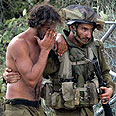
Since Second Lebanon War 119 more soldiers lie in our cemeteries along with 44 civilians
צילום: איי אף פי
Remembering last summer
Second Lebanon War left new graves, deep sorrow on both sides of the border
Last summer was not as hot as this summer, at least not in July. And even if it wasn't cooler, at least it was a lot less suffocating and less distressing.
Last summer we were all smart, all familiar with the rules of war: How to outflank the enemy from the left, how to attack from the right, and how we shouldn't wait and how hard we should strike.
But this summer, the more we know the less we understand. The country is ridden with black holes that a sea of words, oceans of explanations, diagrams, graphs and miles of investigations cannot explain. These holes are like swallow-holes that crop up one after another in a country that crudely exploits its resources.
This summer, in the spirit of the heavy heat beating down on the walls of our homes, we still have no answer to the question of how on earth this happened to us, and how is it that as the overall picture becomes clearer, it is also becoming increasingly somber and darker. And what should we do with all the tidbits of information that are suddenly cropping up day after day, as though we did not live here long enough to have known.
It's as though we were not here last summer during that moment when the first aircraft lifted off the asphalt tarmac on its way to the north. We were determined, eager to fight and confident that our iron fist would wipe the smile off Nasrallah's face once and for all.
An entire nation – at least 90 percent according to surveys - thought that this was the right thing to do. An entire nation believed that this was an opportunity to settle a score - which had never been settled and would never be settled - through the barrel of a gun. And this was the surrender of a human herd to the lure of power. And on both sides of the border, like street vendors at the end of a long day, each side counted its victories.
Ground zero
Yet now, 119 more soldiers lie in our cemeteries along with 44 civilians, and there are many more in their cemeteries. And on both sides of the border a deep sorrow prevails that can find no respite. An absolute, bitter silence is buried under piles of paperwork, dozens of crates full of documents and hundreds of folders that are continuing to swell with the passing of every new day. And what will happen if we discover another detail? We have already wept, cried out, protested – so what's next?
The precarious times have returned to their old tempo. So has life. Similar to the end of all our wars, similar to the end of the wars that are still to come. Halutz left for high-yielding private business; Peretz went home to devise the schemes that would bring him back to what he thinks is his rightful place; Olmert is nonchalantly shirking the voices of protest; generals are replacing other generals, and on the border, in an extraordinarily hot summer, soldiers in uniform are rattling their sabers.
Yet only for some people the new tempo is dictated by sleepless nights. They envision soldiers entering in lines and leaving scattered and broken like the images of old war movies. Storming again and again. And these people, who do not sleep at night, go to the dead, and the dead do not come to them. And they fight the desperate need to restore things to the old order.
For many people, not only from the immediate circles of bereavement, last summer presents point zero. Ground zero, the big bang. And this summer is only the first summer after that war.










